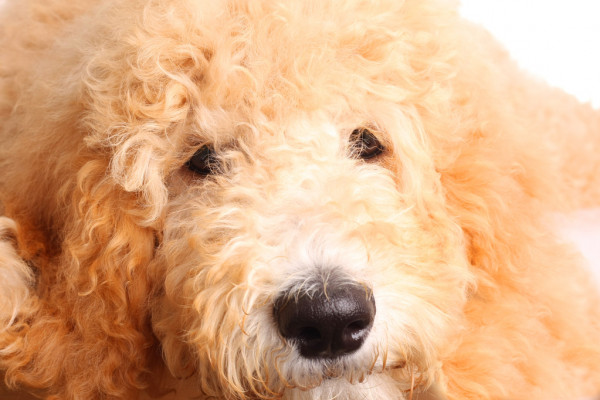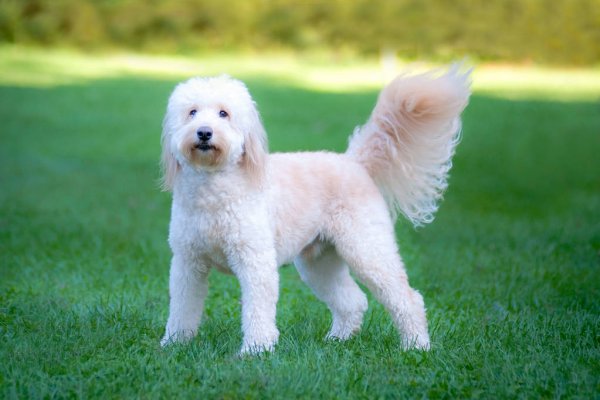These fluffy adorable hybrid dog from purebred golden retriever and purebred poodle have irresistible charm that makes you want to adopt one.
But before owning a “Goldendoodle” or “Goldenpoodle,” pet owners must seek what experts have to say about them being hypoallergenic. This is to ensure that those with severe allergies can own a dog without experiencing allergic reaction to the dander or dead skin cells released by their curly coat.
So, in order to answer “Are Goldendoodles Hypoallergenic?,” let’s explore more about Goldendoodles and whether or not they will be a good fit for you!

What is an Hypoallergenic Dog?
Hypoallergenic is the term used to describe “less likely” to cause an allergic reaction. Likewise, a hypoallergenic dog is a breed that is less likely to trigger an allergic reaction.
The most common source of these allergenic particles is dog’s coat, allowing loose skin dander and dead skin particles to pass through. When released into the air, it can cause pet allergies.
Are Goldendoodle Hypoallergenic?
Are goldendoodles hypoallergenic? It’s complicated. While there are no 100% hypoallergenic dogs, Goldendoodles are among many dog breeds that do well with allergy sufferers.
However, there’s no guarantee that living with and caring for a Goldendoodle will prevent someone from developing an allergic reaction. It all depends on the generation they come from, the genetic pool they receive , and how much they shed. These factors will determine how much shedding the dog will produce.
After all, poodles are known for less likely to shed, while golden retrievers are known to shed a lot.
Are There Ways to Minimize Dog Allergies Caused By Goldendoodles?
The good news is, there are ways to reduce the spread of dander and dead skin cells to ensure that their shedding is manageable. Here are few ideas:
Daily brushing. Since dander and dead skin cells sit on your dog’s hair, brushing your dog as often as possible, can limit the number of allergens your dog carries and spread. Plus, doing this can also aid in the distribution of the skin’s natural oil.
Grooming. The hair on a dog’s body never stops growing, and the (growth) of allergens in the environment doesn’t as well. Grooming and trimming your Goldendoodle, either with grooming tools or with the help of a professional groomer, is the best approach to fix this problem.
Bathe them at least twice a month. Bathing with a great shed control shampoo can wash off every particle that may cause allergens such as dust, pollen, dander, and dried saliva. Avoid using human shampoo as it may be irritated.

Keep your house clean on a regular basis. Whether you brush or groom your dog inside the house or not, you should vacuum or sweep immediately to remove any pet dander that has settled around your home or fallen into the ground. Vacuum your furniture, rugs, covers, and other surfaces where dog hair can readily accumulate.
Use an anti-allergen solution. After taking a bath, you can spritz or apply any allergen neutralizing products available at your local pet store.
Feed them with foods that are high in Omega 3 and Omega 6. Feeding your dog the right food is much as important. You can feed Goldendoodle a kibble with omega 3 and 6, which can make their skin healthier.
Get an air filter. Air filters can help you breathe comfortably and minimize the spread of allergens and other contaminants inside your home.
Everyone knows that shedding is unavoidable, and it’s all too easy to get caught up in a mess. But To keep yourself and those around you safe from allergic reactions, it’s better to follow these safety precautions and avoid possible adverse outcomes.

Can You Have a Goldendoodle If You Have Allergies?
Since you’ve established that Goldendoodles are hypoallergenic, the next question is, “Can you take it home?”
The answer is, Yes! You can have a Goldendoodle even if you are allergic to dog hair.
Even though there is no guarantee that Goldenpoodles will never shed, studies show that they are a wonderful dog breed for people with allergies due to their genetic makeup and low shedding tendencies (less hair).
But before getting a Goldendoodle puppy, you should speak first with your trusted veterinarian and follow their recommendations for the Goldendoodle you wish to bring home. Don’t forget to seek guidance from your physician as well.
Final Thoughts
Allergy sufferers should thoroughly investigate the breed of dog they consider adopting before bringing a new pet into their home. If you’re contemplating getting a Goldendoodle, rest assured that it’s one of the many hypoallergenic breeds out there.
But still, no guarantee living with one will prevent anyone from developing a reaction. It all depends on the genetic pool they were given and how much they shed.
Fortunately, there are ways you can minimize allergens caused by your dog’s shedding to ensure their coat is healthy and manageable for an allergy sufferer.
With the support of your local vet, personal doctor, and effort to minimize allergens, it’s time to adopt a new best friend!
One thing is for sure: Goldenpoodles is an excellent choice for allergy sufferers!


Pingback: 8 Common Hypoallergenic Poodle Mixes for Allergy Sufferers - Doodle Furbabies